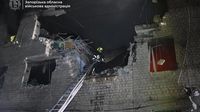A Ukrainian drone attack has killed at least seven people in Kherson, while a Russian drone attack on Odesa left two more dead, a grim reminder of the ongoing conflict as the United States and Ukraine signed a controversial minerals deal.
The attack in the partially occupied Kherson region of southern Ukraine on Thursday, May 1, 2025, struck a market in the town of Oleshky, resulting in seven fatalities and more than 20 injuries, according to local authorities. Vladimir Saldo, the Moscow-installed head of the Kherson region, confirmed the casualties. The Ukrainian military, however, stated that the strike targeted Russian troops and insisted that only military personnel were killed.
In a separate incident, the Black Sea port city of Odesa was hit by Russian drone strikes, which killed two individuals and injured 15 others. Emergency services reported significant damage to civilian infrastructure, including a high-rise residential building, a school, and a supermarket. Additionally, late Thursday saw at least 14 more injuries from a Russian attack on Ukraine’s southeastern city of Zaporizhzhia, according to regional governor Ivan Fedorov.
The backdrop of these attacks was the signing of a minerals deal between Ukraine and the US, aimed at granting the US priority access to Ukraine’s critical minerals as a means of deterring further Russian aggression. Ukraine’s Minister of Foreign Affairs, Andrii Sybiha, described the agreement as a significant milestone in the Ukraine-US strategic partnership, emphasizing its potential to strengthen both Ukraine’s economy and security.
President Volodymyr Zelenskyy hailed the deal as an equal and fair agreement that paves the way for modernization of Ukraine’s industries. The First Deputy Prime Minister, Yulia Svyrydenko, stated that parliament aims to ratify the agreement within weeks, underscoring the urgency of the situation.
Significantly, the deal includes provisions for the establishment of a Reconstruction Investment Fund, which will allow Ukraine to retain full control over its subsoil, infrastructure, and natural resources. Prime Minister Denys Shmyhal noted that Ukraine successfully negotiated last-minute concessions, including the assurance that it would not be forced to repay previous US aid.
However, questions remain regarding how the US will access resources located in areas currently under Russian control, as approximately 40 percent of Ukraine’s metal resources are estimated to be occupied by Russian forces. Ukrainian lawmaker Oleksiy Goncharenko expressed cautious optimism, labeling the deal a step in the right direction while remaining vigilant about its implications for Ukraine’s economic future.
Former Russian President Dmitry Medvedev ridiculed the agreement, suggesting that Ukraine would now have to pay for US military aid with its mineral resources. Goncharenko dismissed Medvedev’s claims, clarifying that the deal does not impose any debts on Ukraine.
In a broader context, the US has been reevaluating its stance on the Ukraine conflict. The recent signing of the minerals deal reflects a shift in Washington’s rhetoric, with language explicitly acknowledging Russia’s full-scale invasion of Ukraine. This change signals a more robust commitment to supporting Ukraine in its ongoing struggle against Russian aggression.
As the conflict continues, the situation remains fluid. Putin has announced a three-day ceasefire from May 8 to May 10, 2025, coinciding with Russia’s celebrations for the 80th anniversary of victory over Nazi Germany. Meanwhile, Kyiv has been advocating for an immediate and unconditional ceasefire lasting at least 30 days, but Putin has indicated that several issues need clarification before any ceasefire can be agreed upon.
Amidst the ongoing violence, the international community remains watchful. The recent attacks in Ukraine serve as a stark reminder of the conflict's human toll, as civilians continue to bear the brunt of the violence. The situation is further complicated by the geopolitical implications of the minerals deal, which could reshape the dynamics of international relations in the region.
In conclusion, as Ukraine grapples with the immediate impacts of drone strikes and the broader implications of its new partnership with the US, the path forward remains fraught with challenges. The evolving landscape of the conflict continues to demand attention from global leaders, as the stakes grow ever higher for both Ukraine and its allies.




